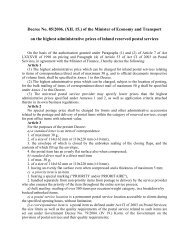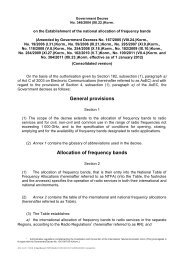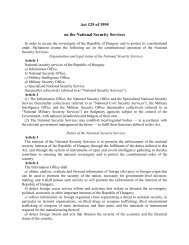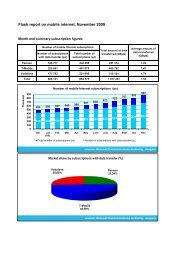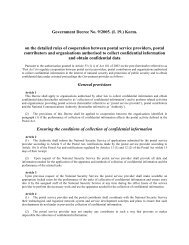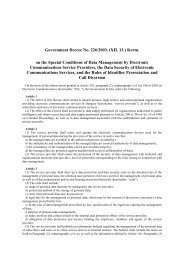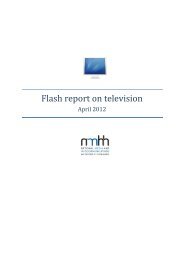The Hungarian Communications Market Developments and ...
The Hungarian Communications Market Developments and ...
The Hungarian Communications Market Developments and ...
Create successful ePaper yourself
Turn your PDF publications into a flip-book with our unique Google optimized e-Paper software.
16 17<br />
Decision<br />
Round 1<br />
Year<br />
Round 2<br />
Year<br />
2005 2006 2007 2008 2006 2007 2008<br />
Total<br />
Reference interconnection offers (RIO) - 5 5* 1* - - 5 16<br />
Reference unbundling offers (RUO) - 5 5* - - - 6 16<br />
Establishment of wholesale price "Retail minus” (RM) - 6+3* 14* - - - 5 28<br />
Accounting separation - 5 8* 2 - - 2 17<br />
Mobile termination rates 2 1+3* - - 3 - - 9<br />
Prices of terrestrial broadcasting - - - 1 - - - 1<br />
* modification decision<br />
M<strong>and</strong>ated service providers may have recourse to remedies<br />
against the decisions of NHH as provided by law. This is an option<br />
service providers, in fact, resorted to several times over the past<br />
years. <strong>The</strong>y typically challenged those decisions of NHH that involved<br />
the introduction of some kind of price control, in particular<br />
if this meant an obligation of setting cost-based prices.<br />
In connection with the first round of market analysis, thirteen<br />
claims were submitted to the Budapest Metropolitan Court by service<br />
providers with reference to seven decisions, to be followed by<br />
ten claims against four decisions in the second round.<br />
In all court proceedings completed so far, the court decided in<br />
favour of NHH. <strong>The</strong> majority of such proceedings ended with the final<br />
decision by the Budapest Metropolitan Court, <strong>and</strong> the Supreme Court<br />
made a final judgement in favour of NHH in the case of the mobile termination<br />
market. Currently, there are two proceedings underway: one<br />
at the Court of Appeal, as the Budapest Metropolitan Court rejected<br />
the claim of the defendants (<strong>Market</strong> 16, second round decision) <strong>and</strong><br />
another one at the Budapest Metropolitan Court (<strong>Market</strong> 18).<br />
2.3 Frequency management<br />
Frequency management is a duty performed in order to ensure the<br />
operating conditions of the different civil terrestrial, over-the-air,<br />
satellite, fixed-location <strong>and</strong> mobile radio services in Hungary as<br />
well as to guarantee undisturbed spectrum usage <strong>and</strong> environment.<br />
This concurrently involves regulatory, market surveillance, licensing,<br />
record keeping <strong>and</strong> planning activities. <strong>The</strong> basic tasks <strong>and</strong> rules<br />
as regards frequency management are laid down in Eht., <strong>and</strong> its<br />
associated regulations <strong>and</strong> the decisions of the European Union. <strong>The</strong><br />
Authority performs this work in harmony with the decisions <strong>and</strong> recommendations<br />
of international organisations of radiocommunication,<br />
in particular the International Telecommunication Union’s Radiocommunication<br />
Sector (ITU-R) <strong>and</strong> the Electronic <strong>Communications</strong><br />
Committee of the European Conference of Postal <strong>and</strong> Telecommunications<br />
Administrations (CEPT/ECC).<br />
<strong>The</strong> task of frequency management incorporates the following<br />
main activities:<br />
• licensing<br />
• control<br />
• record keeping<br />
• information provision<br />
• frequency planning<br />
• frequency coordination<br />
• determination of frequency fees<br />
• development <strong>and</strong> continuous maintenance of the rules for frequency<br />
usage<br />
• monitoring of technological development, preparation of forecasts<br />
for future use of b<strong>and</strong>s<br />
• participation in the legislative process of preparing legal regulations<br />
• participation in the work of international organisations.<br />
Administrative duties related to frequency management<br />
<strong>The</strong> number of licensing cases (procedures, decisions) was between<br />
8 <strong>and</strong> 14 thous<strong>and</strong> per year in the period between 2004 <strong>and</strong> 2008.<br />
As regards radiocommunication, international frequency coordination<br />
with neighbouring countries resulted in a series of bilateral <strong>and</strong><br />
multilateral agreements for 400 MHz, 1800 MHz, 3.5, 26 <strong>and</strong> 28 GHz<br />
b<strong>and</strong>s. <strong>The</strong> Authority carried out a review of government allocations<br />
previously coordinated in the frequency b<strong>and</strong> of the Uniform Digital<br />
Radiocommunication System (EDR), investigated the agreement of<br />
preferred allocation <strong>and</strong> coordinated assignments in the 400 MHz<br />
b<strong>and</strong>s, updated the annexes of service providers’ agreements, <strong>and</strong><br />
provided information to domestic end users. With an increase from<br />
6,433 in 2004 to 12,521 in 2007, the number of coordination tasks<br />
almost doubled to surpass 12,000 already in the first half of 2008.<br />
A significant growth is apparent also in market surveillance activities<br />
as regards radiocommunication, particularly in the field of freeto-air<br />
broadcasting. Duties concerning free-to-air broadcasting also<br />
assume a significant role within coordination activities, primarily due<br />
to the introduction of digital free-to-air broadcasting.



